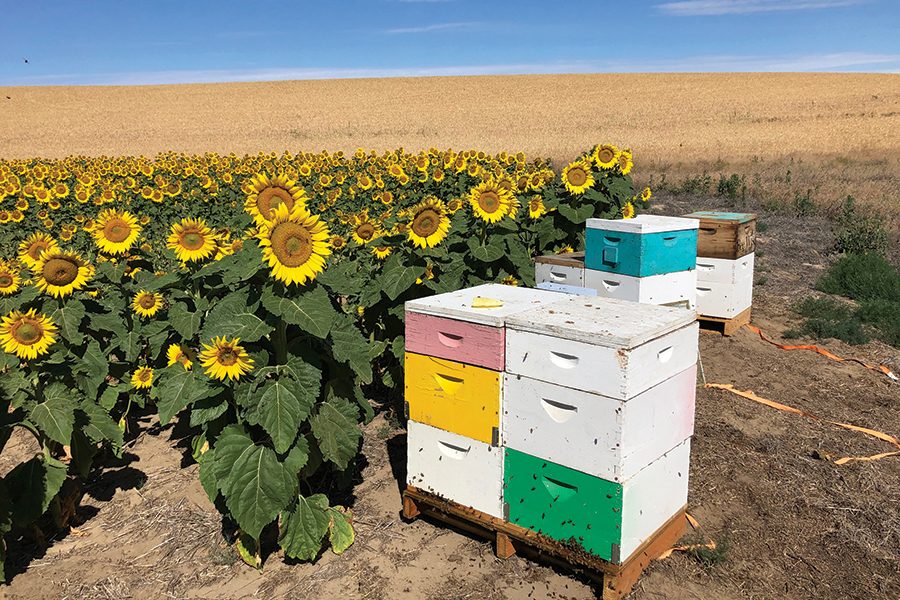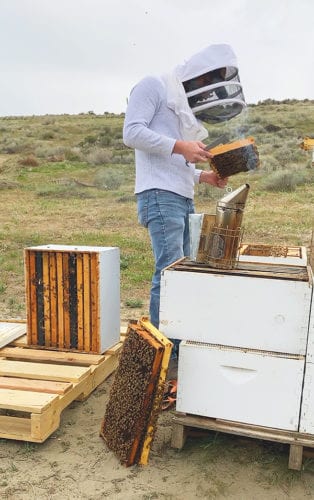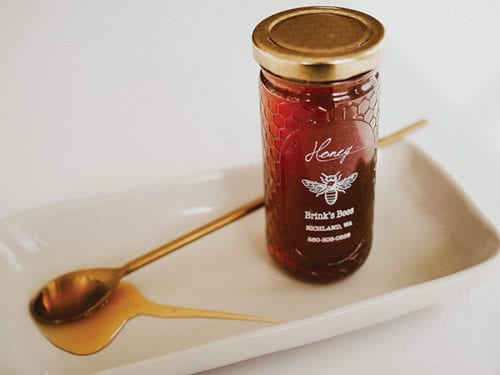
Home » Beekeeper pollinates Northwest crops, sells varietal honey
Beekeeper pollinates Northwest crops, sells varietal honey

June 14, 2021

In just a few short years, Aaron Brink went from an annoyed homeowner, frequently stung by bees while mowing, to a commercial beekeeper who laughs off daily stings while tending to hundreds of beehives.
“I’m immune to bee stings,” said Brink, owner of Brink’s Bees. “I got into the bees as a hobby, not a business.”
But the hobby proved to be a good business. Today, Brink’s Bees offers pollination services to farmers in Oklahoma, California, Oregon and Washington, and honey sales at local farms. One coffee shop consumes an entire 40-pound bucket of honey weekly.
Brink manages 45 million bees across about 200 hives placed around the Tri-Cities. He describes it as a “small” operation compared to commercial pollinators. His honeybees pollinate many of the apples, cherries, pears and other locally grown crops.
“For all the crops we love to eat, anything that has color or vibrancy in the supermarket, honeybees helped pollinate,” Brink said. “They help provide about 40% of the food supply, including fruits, vegetables, nuts and seeds.”
Brink said commercial pollination is a competitive industry. He’s one of about 20-30 companies in the Tri-Cities.
The path into commercial beekeeping began in 2015 in Oklahoma when Brink had a hive in the soffit of his home. The bees would become agitated when he worked in the lawn. He called pest control to have it removed.
He was advised to call a beekeeper instead out of concern over declining honeybee populations.

A professional beekeeper would destroy the hive but encourage the bees to make their home in a new hive box. Brink decided to attempt the job himself when he was quoted a $1,200 fee. It would have been money well spent.
“That was an awful, awful mistake. I got stung quite a bit,” he said.
But he succeeded in removing the bees and posted about it on social media.
Within a couple of weeks, friends were asking for help relocating bees at their homes in southwest Oklahoma. He soon found himself with a side job as a beekeeping hobbyist.
Brink figured he might break even by dabbling in bee removal, beekeeping and honey sales.
He already owned a gym, which provided a ready-made site to sell his honey, alongside nutrition supplements. By the end of the first year, Brink had 15 hives that collectively produced 1,000 pounds of honey. He sold out.
Realizing he had done more than break even, Brink expanded his reach. By the following year, he was managing 50 hives. He kept reinvesting in the business, growing it to hundreds of hives, each with about 50,000 honeybees. He turned his focus on pollination services to farmers.
“The pollination season starts about the first of January here in the Tri-Cities, and in Oklahoma, we’re preparing the hives for transport to California for the almond crop,” Brink said. “We bring the hives to a central location to inspect them and ensure they’re large enough and healthy enough to make the trip. If a hive isn’t large enough, you don’t get paid for the pollination.”
Within a month, the hives are clipped onto pallets, loaded in a tractor-trailer and covered with a net to travel on the freeway like any other truck shipment.
“You would be surprised at how many times weekly in the Tri-Cities you drive by hundreds of hives on a truck,” Brink said.
Bees on the move
Brink’s hives are part of millions shipped to central California each year, as beekeepers are paid hundreds of dollars per hive for the pollination service.
“At that point of the year, almost 100% of the United States’ honeybee supply is in California for the almond population,” Brink said. “They need that many, and it continues to grow year after year.”
Brink’s bees complete their work on the almonds by early March and then travel to the Tri-Cities.
“From late March to early May, they’re pollinating all the stone fruits and apples,” Brink said. “Generally, they’ll be in cherries for one week, and then we move them to apples and then we move them to pears. The majority of the operation, we’ll move their hives out of the orchards and they’ll go to honey production yards throughout the Tri-Cities, the county and the Pacific Northwest.”
Honey is big business
Brink specializes in varietal honey. He offers a wide range of floral flavors, with the taste of the honey impacted by the blossom the bees pollinated. His bottled honey can range in color and flavor, whether it came from spring or fall wildflowers, lavender, or blackberries.
“I feel like a lot of the general public loses out on what honey could be, and the different tastes there are,” compared to the imported mass market clover honey typically sold in stores.

Honey is big business in Washington, as the state’s commercial beekeepers produced 3.63 million pounds of honey last year, according to the U.S. Department of Agriculture.
The crop was valued at $9.2 million, a nearly 50% increase over the previous year.
The amount of honey produced by Washington’s 98,000 bee colonies is greater per colony compared to nearby Idaho and Oregon. It is not as great as Oklahoma, where Brink said his hives average about 200 pounds of honey yearly per hive, compared to about 50 pounds for hives in the Tri-Cities. Washington hives averaged 37 pounds in 2020.
At this point in the calendar year, Brink’s bees have mostly finished their pollination role in the Northwest. Many are shipped back to his home state.
“When they go to Oklahoma, we put them out for honey production in the cotton and sesame crops. I might see my Oklahoma bees once a year when they come back here. They work year-round,” he said.
Brink works year-round as well, spending up to eight hours a day on hive management in addition to his full-time job as a manager for UPS.
“There are wonderful rest periods throughout the year. By the end of October, we’re completely done. We don’t manage, we don’t open the hives. They’re going to survive through the winter,” he said.
But until that time, the management includes efforts to strengthen the hives and prevent swarming.
“The hives have grown so much that the old queen wants to leave and take half the hive with her. We manage them by splitting the hives so one hive becomes two, or we take bees and frames and move it to a weaker hive,” Brink said.
The goal is to keep each hive on an even keel heading into honey production so the bees don’t target another hive or its queen.
The bees produce honey during the summer, which acts as fuel to get them through the winter. Brink’s hives are located on landowner’s property, usually about 16 hives every two square miles to allow enough opportunity for foraging. The property owner gets the benefit of potential pollination and usually a case of honey at the end of the year.
Hives are in place at Haven Flower Farm in Kennewick and SunKissed Lavender Farm in West Richland. Both sell the honey.
“I partner with local businesses that do charcuterie boards, and wineries, to work on pairings, instead of producing large quantities of bulk honey,” Brink said.
His honey is also available at Richland’s Barracuda Coffee and Kennewick’s The Gathering Home. Local Pumpkin, a Pasco-based natural grocery delivery service, offers it as an add-on to subscribers.
Hive sponsorships
Brink offers bee-minded business owners the chance to sponsor a hive for $500.
“It not only helps with our local pollination, and the honeybee supply, it allows us to have a little bit of community outreach and gives those businesses exposure,” he said.
Sponsor dollars pay for new equipment, hives and bees, and the ongoing management. Sponsors don’t have to touch the hives, but their company’s logo is added to the hive box. Bee sponsors are mentioned on social media and the owners can visit “their” hives if they wish.
“If they want to come out, I have suits they can get in,” Brink said. He typically wears only a veil to handle the hives, but if he notices the bees are testy, he’ll wear a full suit for protection.
Brink expects a “very rough” year for honey production in 2021 due to limited rain. Bees are threatened by loss of habitat, pesticides, herbicides, pests and disease.
“Nationally we lose about 40% of bees every winter. It’s our goal as commercial beekeepers to contain that loss each year. Some years are worse than others, but that’s the national average.”
Brink said the public can help by allowing for some of the native pollinators’ foraging favorites – like dandelions – to remain.
“That has a very dramatic effect on how healthy the hives can be,” he said.
To sponsor a hive, contact Aaron Brink at 580-305-0538 or brinksbees@gmail.com.
Business Profiles Local News
KEYWORDS june 2021





